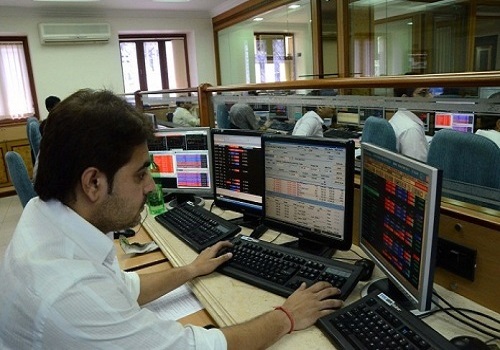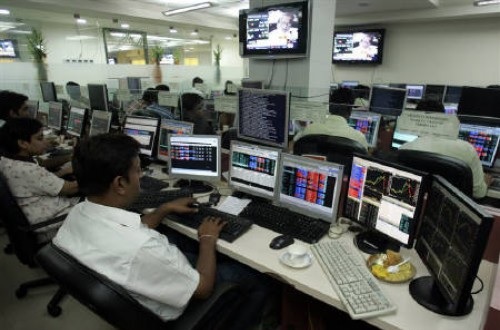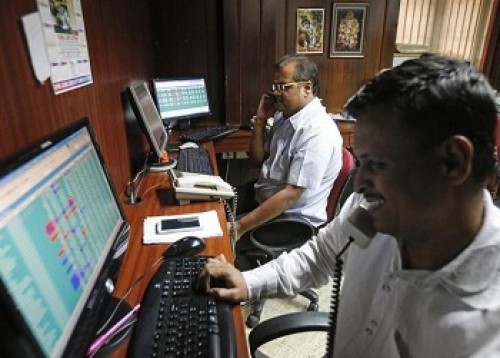Can the war cool down our economy's steam? By Ms. Yesha Shah, Samco Securities
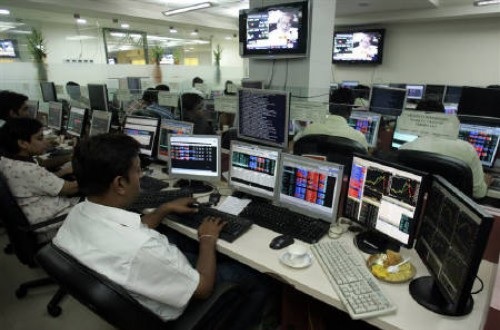
Below is the weekly article on Market By Ms. Yesha Shah, Head of Equity Research, Samco Securities
Can the war cool down our economy's steam?
Markets commenced the week in a sour mood, but appeared to be reclaiming lost ground as tensions between Russia and Ukraine began to de-escalate. While the worst may appear to be over, a sustained spike in inflation may be on the cards, since consecutive sanctions imposed on Russia have spurred an unabated surge in commodity prices. Even while India is better prepared, it is not immune to these events. According to third-quarter GDP data, Indian industry grew at a subdued pace, attributable primarily to the sluggish domestic demand. Slower government investment and weak rural demand impeded development, with agriculture posing as a key drag, achieving the lowest growth rate in the preceding 11 quarters. Furthermore, while a large segment of our population struggles with stagnant or declining incomes and rising living costs, the current private demand evident is more so emerging from the upper end of the pyramid. This, combined with persistently rising inflation, may point to the emergence of a stagflationary situation wherein economic growth momentum moderates.
If commodity prices continue to rise unchecked, businesses across industries will be forced to pass on some price increases to consumers in order to safeguard their margins. This would be a double whammy for them since price rises might dampen demand, affecting both the top line and bottom line. This may eventually create a slowdown in the trend of corporate earnings growth, resulting in more earnings downgrades than expected. Furthermore, this can be a major blow to RBI's inflation stance and might lead to a precarious situation, especially given that the central bank may still want to nurture growth. While the long-term implications of the war would be unpredictable, investors should be wary of the possible macroeconomic challenges that India may confront. Considering this, investors can be overweight in sectors that are both inflation and demand resilient.
Event of the week
Airlines are eyeing brighter skies ahead as international commercial flights to and from India are set to resume operations after a two-year hiatus. As a consequence, Indian airlines’ yield is expected to be improve due to international segment’s higher margins. Furthermore, as Covid restrictions are repealed, a progressive increase in business demand might propel corporate travel demand. Indicative February passenger statistics implies that air traffic is on an increasing trend. While these tailwinds are in place, the sector's recovery is being hampered by rising crude oil prices. In addition, with the Tata group's acquisition of Air India and the debut of Akasa Air scheduled for this summer, the industry's competitive landscape is changing. While the sector's long-term growth prospects are promising, in the short run it will be important to observe whether the aviation companies win the war against continuously rising ATF costs.
Technical Outlook
Nifty 50 indexes closed on a positive note for the week after a short-covering rally was witnessed as geopolitical tensions started easing. Having said that, the short-term trend still remains bearish on the charts and Nifty is facing strong selling pressure around 16,800 levels. The undertone of global indices continues to be bearish as well. Till Nifty decisively breaks above 16,800 levels, we suggest traders to maintain a neutral to the mild bearish outlook. Aggressive traders can look to take a short position in the Nifty index on a break below 16,450 while keeping the stop loss around 16,750 levels.
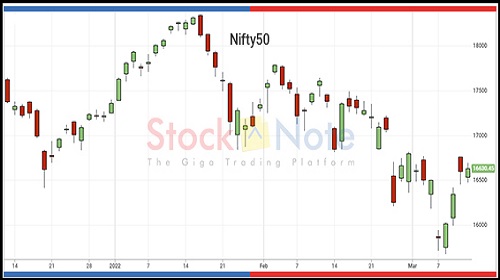
Expectations for the week
Along with the ongoing war, the conclusion of the Fed's FOMC March meeting will be the main headliner the coming week. This Fed meeting is especially important considering the unknowns emerging out of the Russia-Ukraine crisis. Market players will be looking for clues from the FOMC's assessment of the inflation risk and how aggressive it is willing to be with interest rate rises. Back home, the domestic inflation rate would be the crucial parameter impacting market sentiments early next week as all eyes will be on the deviation between the actual print compared to RBI forecasts. Given these significant events, volatility may rise, and investors are recommended to continue cherry-picking resilient stocks while avoiding vulnerable counters. Nifty50 closed the week closed the week at 16630.5 up by 2.37%.
Above views are of the author and not of the website kindly read disclaimer


